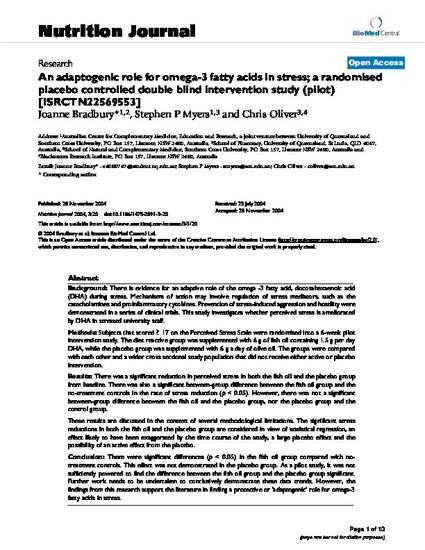
Article
An adaptogenic role for omega-3 fatty acids in stress; a randomised placebo controlled double blind intervention study (pilot) [ISRCTN22569553]
Nutrition Journal
Document Type
Article
Publication Date
1-1-2004
Peer Reviewed
Peer-Reviewed
Abstract
Background: There is evidence for an adaptive role of the omega -3 fatty acid, docosahexaenoic acid (DHA) during stress. Mechanisms of action may involve regulation of stress mediators, such as the catecholamines and proinflammatory cytokines. Prevention of stress-induced aggression and hostility were demonstrated in a series of clinical trials. This study investigates whether perceived stress is ameliorated by DHA in stressed university staff. Methods: Subjects that scored ≥ 17 on the Perceived Stress Scale were randomised into a 6-week pilot intervention study. The diet reactive group was supplemented with 6 g of fish oil containing 1.5 g per day DHA, while the placebo group was supplemented with 6 g a day of olive oil. The groups were compared with each other and a wider cross sectional study population that did not receive either active or placebo intervention. Results: There was a significant reduction in perceived stress in both the fish oil and the placebo group from baseline. There was also a significant between-group difference between the fish oil group and the no-treatment controls in the rate of stress reduction (p < 0.05). However, there was not a significant between-group difference between the fish oil and the placebo group, nor the placebo group and the control group. These results are discussed in the context of several methodological limitations. The significant stress reductions in both the fish oil and the placebo group are considered in view of statistical regression, an effect likely to have been exaggerated by the time course of the study, a large placebo effect and the possibility of an active effect from the placebo. Conclusion: There were significant differences (p < 0.05) in the fish oil group compared with no-treatment controls. This effect was not demonstrated in the placebo group. As a pilot study, it was not sufficiently powered to find the difference between the fish oil group and the placebo group significant. Further work needs to be undertaken to conclusively demonstrate these data trends. However, the findings from this research support the literature in finding a protective or 'adaptogenic' role for omega-3 fatty acids in stress.
Disciplines
Citation Information
Bradbury, J, Myers, SP & Oliver, C 2004, 'An adaptogenic role for omega-3 fatty acids in stress; a randomised placebo controlled double blind intervention study (pilot) [ISRCTN22569553]', Nutrition Journal, vol. 3, no. 20.
© 2004 Bradbury et al; licensee BioMed Central Ltd. This is an Open Access article distributed under the terms of the Creative Commons Attribution License (http://creativecommons.org/licenses/by/2.0), which permits unrestricted use, distribution, and reproduction in any medium, provided the original work is properly cited.
Published version available from:
